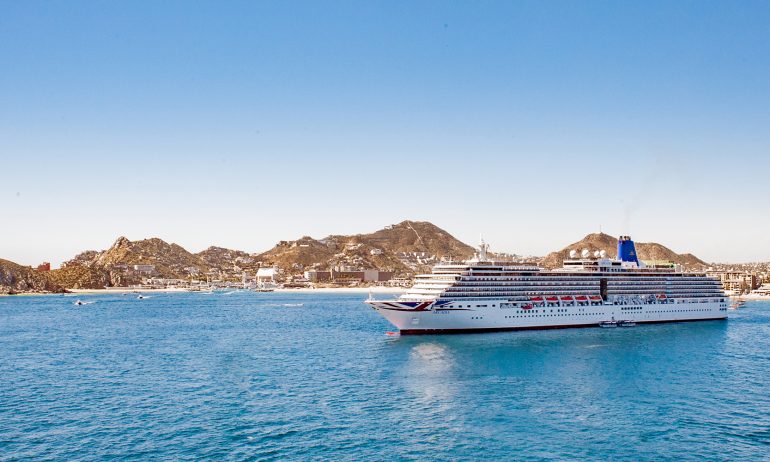Many or all of the products featured here are from our partners who compensate us. This influences which products we write about and where and how the product appears on a page. However, this does not influence our evaluations. Our opinions are our own. Here is a list of our partners and here's how we make money.
According to industry trade organization Cruise Lines International Association, over 30 million people took cruises last year. It’s safe to say that number will be lower in 2020.
During a highly contagious outbreak, a vacation in which thousands of people are traveling together on a ship is seen as potentially life-threatening. And even during the travel industry’s recovery period, airlines and hotels will have to be operating before cruise lines do. Passengers need a way to get to the ship and a place to stay the night before their departure.
I’ve followed cruise line stocks for financial services firms for 17 years and taken over 30 cruises personally, giving me a good perspective on what we might expect to see as both a financial analyst and passenger. While I think the industry will recover, it may not be until 2021 or later — and even then, ships likely won’t sail full at first. And while some changes will be temporary, there are others that could change cruising permanently. Here are a few.
Health checks are in
Cruise lines became much more stringent about health requirements after articles about norovirus threatened to scare off passengers. Signs about washing hands appeared everywhere, bottles of hand sanitizer showed up at restaurants, and passengers were asked to fill out a short health questionnaire before boarding.
Those precautions are likely to seem quaint after COVID-19. I’m not saying you’ll be required to present a doctor’s note of immunity to board a ship, but you’ll get more than a few questions about your health and may be subject to a temperature check or similar screening. The muster drill, which is the first-day assembly to discuss safety, may be as much about health risks as it is about emergency evacuation.
Here’s the part that could hurt the most: Until there is a vaccine for the novel coronavirus, a ship will likely go into lockdown as soon as anyone onboard shows symptoms of the disease, particularly given passenger demographics.
A few years ago, a Carnival Cruise Line executive told me that the average age of passengers was about 50, meaning that a good number of cruisers fall into an age group that seems more susceptible to complications from COVID-19. That’s what’s most likely to impede the recovery of the industry. It’s going to be hard to get customers to pay for a vacation that might result in their being locked in a cabin for a week or longer.
Self-serve buffets are out
The one image everyone seems to have about cruises is the midnight buffet, with passengers picking at pastries as the stars shine overhead. And while that particular event is no longer necessary (mostly because many cruise lines have become 24-hour feasts), the buffet still plays a large role in the cruise experience.
I think it’s safe to say the buffets will stay. Passengers like them too much and food costs are low. But their nature may change. Instead of serving yourself, it’s likely that all food will be served to you by a crew member from behind a sneeze guard. It doesn’t matter how much hand sanitizer you use before you enter a buffet, the cruise line isn’t going to take a chance with people rifling through pieces of fruit, cookies or any of the other food to which passengers help themselves.
Cruise lines hate to do anything that increases their costs, and full-serve buffets could certainly do so. But labor costs are low (since cruise lines are generally not subject to U.S. labor laws), and I suspect that passengers will take less food when someone serves it to them.
» Learn more: How a new cruise ship is built
Taxes are in (maybe)
While most cruise lines operate out of Florida, their incorporation status is more controversial. Carnival Corp., for example, is incorporated in Panama. This status offers them some benefits, and two of the most important are being shielded from U.S. labor laws and U.S. taxes. In 2019, Carnival paid a tax rate of just over 2%, similar to its publicly traded peers. In normal economic times, nobody makes an issue of it.
But these aren’t normal economic times. The cruise lines have already gone to Wall Street to borrow money or sell stock to finance themselves during COVID-19. If they run out of money again, they may need to approach the government for aid.
That’s where things get interesting — technically, the cruise lines are not U.S. companies. But I think it’s highly unlikely that the federal government will allow them to go under, particularly in an election year, given the number of people they employ in Florida.
And it will be equally unlikely that they will be forced to incorporate in the United States. That ship has sailed, so to speak. But if the companies are forced to approach the U.S. government for a loan, Washington will be in a strong position to get some long-term concessions. The cruise lines won’t be forced to pay the full corporate taxes that other industries pay, but I would not be surprised to see financial implications that would affect them long after whatever loans they receive are paid back.
Is that good? If you’re a U.S. citizen, absolutely. More money in the coffers is always a good thing. But somebody has to pay those added costs, and they will likely be passed along to customers, at least in part.
The bottom line
COVID-19 is going to force cruise lines to change the way they operate. You will see some of the impact onboard, while much of it will be behind the scenes. But I’d bring a thermometer along, just in case.
How to maximize your rewards
You want a travel credit card that prioritizes what’s important to you. Here are our picks for the best travel credit cards of 2024, including those best for:
Flexibility, point transfers and a large bonus: Chase Sapphire Preferred® Card
No annual fee: Bank of America® Travel Rewards credit card
Flat-rate travel rewards: Capital One Venture Rewards Credit Card
Bonus travel rewards and high-end perks: Chase Sapphire Reserve®
Luxury perks: The Platinum Card® from American Express
Business travelers: Ink Business Preferred® Credit Card
on Chase's website
1x-5x
Points60,000
Pointson Chase's website
1.5%-6.5%
Cashback$300
2x-5x
Miles75,000
Miles





